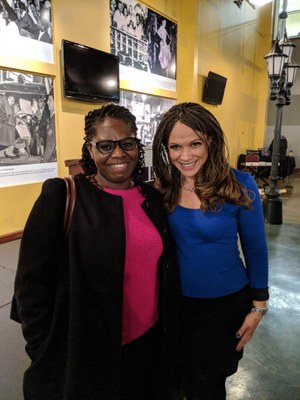SPHIS Home » News » Equity at the 2018 Black Family Conference
Equity at the 2018 Black Family Conference
Written By: Aishia A. Brown, PhD, Postdoctoral Fellow, Commonwealth Institute of Kentucky, March 2018
This February the University of Louisville hosted the 45th annual Dr. Joseph H. McMillan Black Family Conference and I had the  honor of attending. The conference theme, “Elevating the Health and Safety of the Black Family and Community,” highlighted the critical role that health plays within community. Conference break-out sessions focused on Alzheimer’s, addiction, diabetes, prostate cancer, violence, cultural biases, literacy, and healing through African heritage and culture. Attending the conference reinforced the fact that there must be clear, intentional, and innovative approaches adopted in addressing the issues surrounding the health and safety of the Black community.
honor of attending. The conference theme, “Elevating the Health and Safety of the Black Family and Community,” highlighted the critical role that health plays within community. Conference break-out sessions focused on Alzheimer’s, addiction, diabetes, prostate cancer, violence, cultural biases, literacy, and healing through African heritage and culture. Attending the conference reinforced the fact that there must be clear, intentional, and innovative approaches adopted in addressing the issues surrounding the health and safety of the Black community.
As a researcher in the School of Public Health and Information Sciences (SPHIS) I am all too familiar with traditional approaches to solving health issues in the Black community. Often, these approaches are used to address issues like youth violence, obesity, and addiction. We regularly use approaches that pathologize the identity of certain populations. For example, popular approaches to youth violence prevention focus on how young people of color are problems that need to be fixed in our society, often using language like “at-risk” to label them. Another example is how we tend to address obesity by teaching people how to prepare healthy meals without acknowledging the lack of access to healthy food in their neighborhood. This language and these approaches fail to examine and address the root causes of these issues. In addition, these approaches focus on individual level behavior change and fail to recognize the powerful influence that systemic racism continues to have on the Black community.
The 2018 Black Family Conference banquet keynote speaker, Dr. Melissa Harris-Perry who currently serves as the Maya Angelou Presidential Chair at Wake Forest University, encouraged all conference attendees to think differently about the issues surrounding the health of the Black community. Dr. Harris-Parry asked that we pay close attention to the language we use to describe members of the Black community providing the term “achievement gap” as an example of how we often use this language to talk about the deficits of Black youth without recognizing the ways in which this so-called “achievement gap” is actually a better measure of parental income than academic ability. Dr. Harris-Parry also encouraged conference attendees to pay close attention to the narratives surrounding the health of Black women and girls. She noted that oftentimes we hear reports that Black women are the most educated group in our country, but this report fails to acknowledge that the median wealth for Black women is five U.S. dollars. Wealth is connected to health in a number of ways and the wealth of Black women often determines the wealth of Black children and the Black community as a whole.
These critical points made at the 2018 Black Family Conference are important to the work we do as health professionals that work, live, learn, worship, and play in Louisville, KY, a city where the life expectancy of people living in neighborhoods with high rates of poverty is drastically lower than those living in affluent communities. The most important takeaway from the 2018 Black Family Conference is that we must change the way we approach addressing the issues related to the health of the Black community. In order to live in a more equitable world, we have a responsibility to address root causes of the health issues all members of our community face.






